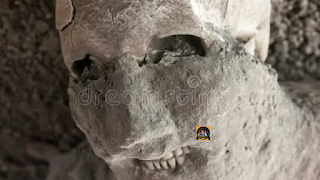Pompeii is an ancient Roman city in Campania, Italy, southeast of Naples, at the southeastern base of Mount Vesuvius. Around noon on August 24, 79 CE, a huge volcanic eruption from Mount Vesuvius showered volcanic debris over the city of Pompeii, followed the next day by clouds of blisteringly hot gases.
Buildings were destroyed, the population was crushed ,people died and the city was buried beneath a blanket of ash and volcanoes. For many centuries Pompeii slept beneath its pall of ash, which perfectly preserved the remains. When these were finally unearthed, in the 1700s, the world was astonished at the discovery of a sophisticated Roman city frozen in time.
Inside were some preserved remains of people sheltering from the eruption; others lay buried as they fled; bakeries were found with loaves still in the ovens. The buildings and their contents revealed day-to-day life in the ancient world—and stirred 18th-century interest in all things classical.



